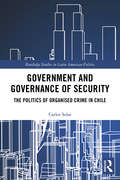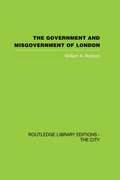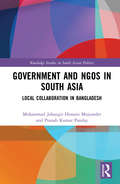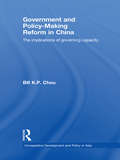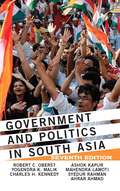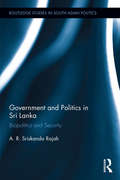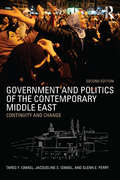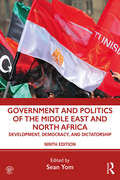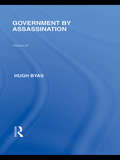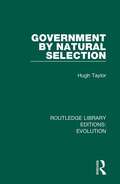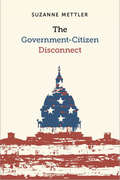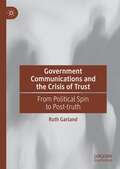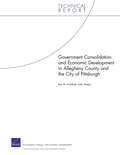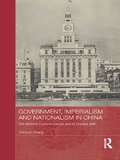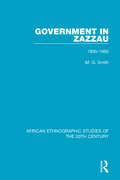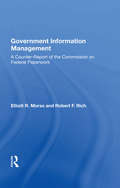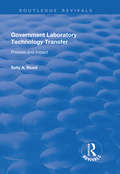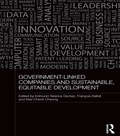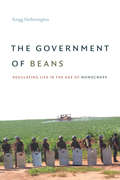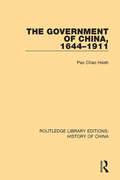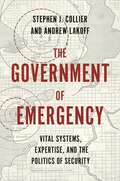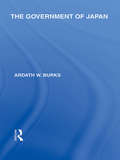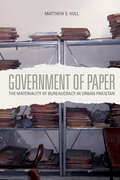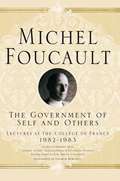- Table View
- List View
Government and Governance of Security: The Politics of Organised Crime in Chile (Routledge Studies in Latin American Politics)
by Carlos SolarAt a time when Latin America is experiencing societal unrest from human rights violations, corruption and weak institutions Government and Governance of Security offers an insightful understanding for the modern steering of crime policies. Using Chile as a case study, the book delivers an untold account of the trade-offs between political, judicial and policing institutions put in practice to confront organised crime since the country’s redemocratisation. In an effort to encompass the academic fields of political science, public policy and criminology, Carlos Solar challenges the current orthodoxies for understanding security and the promotion of the rule of law in developing states. His research aptly illuminates the practicalities of present-day governance and investigates how networks of institutions are formed and sustained across time and, subsequently, how these actors deal with issues of policy consensus and cooperation. To unveil the uniqueness of this on-the-ground action, the analysis is based on an extensive revision of public documents, legislation, media accounts and interviews conducted by the author with the key policy makers and officials dealing with crimes including drug-trafficking, money laundering and human smuggling. Government and Governance of Security will be of interest to scholars of Latin American studies, security and governance and development.
The Government and Misgovernment of London
by William A. RobsonThis book was first published in 1939.
Government and NGOs in South Asia: Local Collaboration in Bangladesh (Routledge Studies in South Asian Politics)
by Mohammad Jahangir Mojumder Pranab Kumar PandayThis book analyses efforts of Bangladeshi government and NGOs to strengthen local governance, and identifies the challenges posed by collaboration with NGOs. Presenting a dominantly qualitative study, the analysis explores whether engagement between the Sharique project to strengthen local governance and the Union Parishads has translated into success. In doing so, it argues that evidence points to a positive impact on institutionalising good governance and fiscal autonomy through widening participation in planning and decision-making, reinforcing accountability of functionaries and enhancing tax collection. Furthermore, this book demonstrates that the collaboration has aided the process of development of social capital between officials of councils and NGOs, as well as amongst the community members, encouraging future partnership governance. However, with the phasing out of the project as a propelling force, it also shows that the results fall short of being sustainable and, as such, that statuary support, unequivocal political commitment, and incentivising engagements are required to stabilise outcomes. Bridging a gap in the Development Studies literature, this book presents new findings on the collaboration of NGOs at the local level. It will be of interest to academics working in the field of South Asian Studies, Development Studies, and Asian Politics.
Government and Policy-Making Reform in China: The Implications of Governing Capacity (Comparative Development and Policy in Asia #Vol. 6)
by Bill K.P. ChouChina’s rapid economic development has not translated automatically into political development, with many of its institutions still in need of major reform. In the post-Mao era, despite the decentralization of local government with significant administrative and fiscal authority, China’s government and policy-making processes have retained much of the inefficiency and corruption characteristic of the earlier period. This book analyzes the implementation of government and policy-making reform in China, focusing in particular on the reform programmes instituted since the early 1990s. It considers all the important areas of reform, including the enhancement of policy-making capacity, reform of taxation and fund transfer policies, tightening of financial control, civil service reform and market deregulation. Bill K.P Chou assesses the course of policy reform in each of these areas, considers how successful reforms have been, and outlines what remains to be done. In particular, he explores the impact on the reform process of China’s entry into the WTO in 2001, demonstrating that the process of reform in China has been one of continuous conflict between the agenda of political elites in central government, and the priorities of local leaders, with local agents often distorting, delaying or ignoring the policies emanating from the central government.
Government and Politics in South Asia
by Yogendra K Malik Charles Kennedy Ashok Kapur Syedur Rahman Mahendra Lawoti Ahrar Ahmad Robert C OberstThis comprehensive but accessible text provides students with a systematic introduction to the comparative political study of the leading nations of South Asia: India, Pakistan, Bangladesh, Sri Lanka, and Nepal. The seventh edition is extensively revised and updated, benefiting from the fresh perspective brought on by adding a new author to the team. New material includes discussions of political parties and leaders in India, the Zardari regime and changes to the Pakistani constitution, the rocky relationship between Pakistan and the Obama administration, new prospects and dangers facing Bangladesh, continuing political violence in Sri Lanka, and the troubles facing Nepal as it attempts to draft a new constitution. Organized in parallel fashion to facilitate cross-national comparison, the sections on each nation address several topical areas of inquiry: political culture and heritage, government structure and institutions, political parties and leaders, conflict and resolution, and modernization and development. A statistical appendix provides a concise overview of leading demographic and economic indicators for each country, making Government and Politics in South Asia an invaluable addition to courses on the politics of South Asia.
Government and Politics in Sri Lanka: Biopolitics and Security (Routledge Studies in South Asian Politics)
by A. R. RajahThe island of Sri Lanka (formerly Ceylon) was one of the few Asian colonies in which the British Empire experimented liberal state-building in the nineteenth century, and where many British colonial officials predicted that the independent state would become a liberal democratic success story. Sri Lanka has held on to much of the liberal democratic state-institutions left behind by the British Empire, including periodic elections. At the same time, the UN’s Office of the High Commissioner for Human Rights concluded in September 2015 that there are reasonable grounds to believe that Sri Lanka committed serious international crimes against the Tamils. Such accusations are usually levelled against authoritarian states; it is unusual for a democracy to face such charges. <P><P> This book analyses where Sri Lanka stands as a state that has in place liberal democratic state-institutions but exhibits the characteristics of an authoritarian state. Using Michel Foucault’s concept of biopolitics, the author argues that Sri Lanka enacted racist legislations and perpetrated mass-atrocities on the Tamils as part of its biopolitics of institutionalising and securing a Sinhala-Buddhist ethnocratic state-order. The book also explores the ways that, apart from military action, power relations produce the effects of battle, and thus the way that peace can often become a means of waging war. The author provides fresh insights into Sri Lanka’s postcolonial policies and the system of government that it has in place. <P><P>A novel approach to analysing Sri Lanka’s postcolonial policies and the system of government, this book will be of interests to researchers in the field of Political Science, Asian Politics and International Relations.
Government and Politics of the Contemporary Middle East: Continuity and change
by Jacqueline S. Ismael Tareq Y. Ismael Glenn PerryThis exciting new edition of the successful textbook for students of Middle Eastern politics provides a highly relevant and comprehensive introduction to the complexities of a region in constant flux. Combining a thematic framework for examining patterns of politics with individual chapters dedicated to specific countries, the book places the very latest developments and long-standing issues within an historical context, introducing key concepts from comparative politics to further explore the interaction between Middle Eastern history and the region’s contemporary political development. Presenting information in an accessible and inclusive format, the book offers: • Coverage of the historical influence of colonialism and major world powers on the shaping of the modern Middle East. • A detailed examination of the legacy of Islam. • Analysis of the political and social aspects of Middle Eastern life: alienation between state and society, poverty and social inequality, ideological crises and renewal. • Case studies on countries in the Northern Belt (Turkey and Iran); the Fertile Crescent (Iraq, Syria and Lebanon, Israel/Palestine); and those West and East of the Red Sea (Egypt and the members of the Gulf Cooperation Council), moving through an historical examination to close analysis of the most recent developments and their political and social impacts. • Extensive pedagogical features, including original maps and further reading sections, provide essential support for the reader. A key introductory text for students of Middle Eastern politics and history at advanced undergraduate and postgraduate levels, this new edition has been extensively updated to also become a timely and significant reference for policy-makers and any motivated reader.
Government and Politics of the Middle East and North Africa: Development, Democracy, and Dictatorship
by Sean YomThe latest edition of this renowned textbook explores the states and regimes of the Middle East and North Africa. Presenting heavily revised, fully updated chapters contributed by the world’s leading experts, it analyzes the historical trajectory, political institutions, economic development, and foreign policies of the region’s nearly two dozen countries. The volume can be used in conjunction with its sister volume, The Societies of the Middle East and North Africa, for a comprehensive overview of the region. Chapters are organized and structured identically, giving insightful windows into the nuances of each country’s domestic politics and foreign relations. Data tables and extensive annotated bibliographies orient readers towards further research. Whether used in conjunction with its sister volume or on its own, this book provides the most comprehensive and detailed overview of the region’s varied politics. Five new experts cover the critical country cases of Turkey, Lebanon, Jordan, Saudi Arabia, and Iran. All chapters cover the latest events, including trends that have remarkably changed in just a few years like the gradual end of the Syrian civil war. As such, this textbook is invaluable to students of Middle Eastern politics.. The ninth edition brings substantial changes. All chapters also have a uniform, streamlined structure that explores the historical context, social and economic environment, political institutions, regime dynamics, and foreign policy of each country. Fact boxes and political maps are now far more extensive, and photographs and images also help illustrate key points. Annotated bibliographies are vastly expanded, providing nothing short of the best list of research references for each country.
Government by Assassination (Routledge Library Editions: Japan)
by Hugh ByasWritten by someone who spent twenty-three years as a journalist in Japan, this book describes the political and military aspirations of Japan at a tumultuous period of twentieth century history. The book examines the workings of the Japanese government and discusses the role of the military in shaping political ideals: ideals which were a compound of Marxism and National Socialism, transformed for Japanese uses and combined with fanatical racial, national and semi-religious obsessions.
Government by Natural Selection (Routledge Library Editions: Evolution #13)
by Hugh TaylorOriginally published in 1915, Government by Natural Selection looks at the historical advancement of government through the lens of the Darwinian theory of natural selection. The book examines the history of government and its formation, right up until the early 20th century, when the book was first published. The book suggests that there is a link between Darwinian theory and the development of humans in societies, and that this in turn affected the formation of government over the course of history. The book uses not only Darwinian theory to examine history and the formation of government, but philosophers from both antiquity and the 19th century. This book provides a fascinating examination of politics and history through the application of science, and will be of interest to anthropologists, historians and academics of politics alike.
The Government-Citizen Disconnect
by Suzanne MettlerAmericans’ relationship to the federal government is paradoxical. Polls show that public opinion regarding the government has plummeted to all-time lows, with only one in five saying they trust the government or believe that it operates in their interest. Yet, at the same time, more Americans than ever benefit from some form of government social provision. Political scientist Suzanne Mettler calls this growing gulf between people’s perceptions of government and the actual role it plays in their lives the "government-citizen disconnect." In The Government-Citizen Disconnect, she explores the rise of this phenomenon and its implications for policymaking and politics. Drawing from original survey data which probed Americans’ experiences of 21 federal social policies -- such as food stamps, Social Security, Medicaid, and the home mortgage interest deduction -- Mettler shows that 96 percent of adults have received benefits from at least one of them, and that the average person has utilized five. Overall usage rates transcend social, economic, and political divisions, and most Americans report positive experiences of their policy experiences. However, the fact that they have benefited from these policies has little positive effect on people’s attitudes toward government. Mettler finds that shared identities and group affiliations, as well as ideological forces, are more powerful and consistent influences. In particular, those who oppose welfare tend to extrapolate their unfavorable views of it to government in general. Deep antipathy toward the government has emerged as the result of a conservative movement that has waged a war on social welfare policies for over forty years, even as economic inequality and benefit use have increased. Mettler finds that voting patterns exacerbate the government-citizen disconnect, as those holding positive views of federal programs and supporting expanded benefits have lower rates of political participation than those holding more hostile views of the government. As a result, the loudest political voice belongs to those who have benefited from policies but who give government little credit for their economic well-being, seeing their success more as a matter of their own deservingness. This contributes to the election of politicians who advocate cutting federal social programs. According to Mettler, the government-citizen disconnect frays the bonds of representative government and democracy. The Government-Citizen Disconnect illuminates a paradox that increasingly shapes American politics. Mettler's examination of hostility toward government at a time when most Americans will at some point rely on the social benefits it provides helps us better understand the roots of today's fractious political climate.
Government Communications and the Crisis of Trust: From Political Spin to Post-truth
by Ruth GarlandThis book opens up the black box of government communication during the age of political spin, using archival and official documents, memoirs and biographies, and in-depth interviews with media, political and government witnesses. It argues that substantive and troubling long-term changes in the ways governments manage the media and publicly account for themselves undermine the public consent essential to democracy. Much of the blame for this crisis in public communication has been placed at the feet of politicians and their aides, but they are just part of the picture. A pervasive ‘culture of mediatization’ has developed within governments, leading to intended and unintended consequences that challenge the capacity of central public bureaucracies to implement public values and maintain impartiality. It concludes that public servants, elected officials and citizens have an important role to play in accounting for governments’ custodianship of this most politically-sensitive of public goods – the public communications function.
Government Consolidation and Economic Development in Allegheny County and the City of Pittsburgh
by Sally Sleeper Rae W. ArchibaldThis report concludes that, although evidence is mixed and effects difficult to measure, consolidating the City of Pittsburgh and Allegheny County could enhance economic development by unifying leadership, improving policy direction and coordination, and sharpening economic-development initiatives. Increased collaboration with the private sector also is important, and combining only two governments still leaves the region highly fragmented.
Government, Imperialism and Nationalism in China: The Maritime Customs Service and its Chinese Staff (Routledge Studies in the Modern History of Asia)
by Chihyun ChangThe Chinese Maritime Customs Service, which was led by British staff, is often seen as one of the key agents of Western imperialism in China, the customs revenue being one of the major sources of Chinese government income but a source much of which was pledged to Western banks as the collateral for, and interests payments on, massive loans. This book, however, based on extensive original research, considers the lower level staff of the Chinese Maritime Customs Service, and shows how the Chinese government, struggling to master Western expertise in many areas, pursued a deliberate policy of encouraging lower level staff to learn from their Western superiors with a view to eventually supplanting them, a policy which was successfully carried out. The book thereby demonstrates that Chinese engagement with Western imperialists was in fact an essential part of Chinese national state-building, and that what looked like a key branch of Chinese government delegated to foreigners was in fact very much under Chinese government control.
Government in Zazzau: 1800-1950
by M. G. SmithOriginally published in 1960, this is a details study of the successive forms of government in the Hausa chiefdom of Zaria in Northern Nigeria. It presents a comparative analysis of the political organization and development of Zaria under successive Habe, Fulani and British suzerains. The book tackles the problems of political history and theory from an anthropological point of view, distinguishing governmental forms, functions and modes, as well as elucidating necessary regularities within the processes of political change.
Government Information Management: A Counterreport Of The Commission On Federal Paperwork
by Elliott R. MorssIn this timely critique of federal procedures, the authors identify the underlying causes of the current overload of information/paper-work in government and explain why the problem cannot be controlled until the causes are eliminated or neutralized. Using a calcuius they have developed for estimating the "value and "burden of federal information,
Government Laboratory Technology Transfer: Process and Impact (Routledge Revivals)
by Sally A RoodThis title was first published in 2000: Due to budget cuts and competitiveness pressures, determining the outcome of technology transfer from government R&D laboratories to private industry and entrepreneurial start-ups is of increasing interest. This book presents a series of case studies of successful technology transfer by examining the same list of topics for each case. It presents a format for analyzing the cases, topic by topic - a methodology that could be used by any R&D laboratory. The book also goes one step further and compares the cases that took place prior to national technology transfer legislation with those cases that took place after passage of such legislation. An additional feature is the summary of existing attempts to measure and evaluate technology transfer. This follows a backgroudn section on the technology policy context. The analysis finds that there is a significant commercial impact from government laboratory transfer using this approach.
Government-Linked Companies and Sustainable, Equitable Development (Routledge Malaysian Studies Series)
by François Bafoil Terence Gomez Kee-Cheok CheongThe debate over how far governments should intervene in economies in order to promote economic growth, a debate which from the 1980s seemed settled in favour of the neo-liberal, non-interventionist consensus, has taken on new vigour since the financial crisis of 2008 and after. Some countries, most of them in industrialised Asia, have survived the crisis, and secured equitable economic growth, by adopting a developmental state model, whereby governments have intervened in their economies, often through explicit support for individual companies. This book explores debates about government intervention, assesses interventionist policies, including industrial and innovation policies, and examines in particular the key institutions which play a crucial role in implementing government policies and in building the bridge between the state and the private sector. The countries covered include China, India, South Korea, Malaysia and Taiwan, together with representative countries from Europe and Latin America.
The Government of Beans: Regulating Life in the Age of Monocrops
by Kregg HetheringtonThe Government of Beans is about the rough edges of environmental regulation, where tenuous state power and blunt governmental instruments encounter ecological destruction and social injustice. At the turn of the twenty-first century, Paraguay was undergoing dramatic economic, political, and environmental change due to a boom in the global demand for soybeans. Although the country's massive new soy monocrop brought wealth, it also brought deforestation, biodiversity loss, rising inequality, and violence. Kregg Hetherington traces well-meaning attempts by bureaucrats and activists to regulate the destructive force of monocrops that resulted in the discovery that the tools of modern government are at best inadequate to deal with the complex harms of modern agriculture and at worst exacerbate them. The book simultaneously tells a local story of people, plants, and government; a regional story of the rise and fall of Latin America's new left; and a story of the Anthropocene writ large, about the long-term, paradoxical consequences of destroying ecosystems in the name of human welfare.
The Government of Childhood
by Karen M. SmithGrounded in the Foucauldian literature on governmentality and drawing on a broad range of disciplines, this book examines the government of childhood in the West from the early modern period to the present. The book deals with three key time-periods and examines shifts in the conceptualization and regulation of childhood and child-rearing.
The Government of China, 1644-1911 (Routledge Library Editions: History of China #8)
by Pao Chao HsiehThis volume, first published in 1925, presents a clear background to the then-contemporary political situation in China, and in doing so sheds much light on the history of Chinese politics. In focusing on the political organization it generates an insightful study of Chinese government.
The Government of Emergency: Vital Systems, Expertise, and the Politics of Security (Princeton Studies in Culture and Technology #28)
by Stephen J. Collier Andrew LakoffThe origins and development of the modern American emergency stateFrom pandemic disease, to the disasters associated with global warming, to cyberattacks, today we face an increasing array of catastrophic threats. It is striking that, despite the diversity of these threats, experts and officials approach them in common terms: as future events that threaten to disrupt the vital, vulnerable systems upon which modern life depends.The Government of Emergency tells the story of how this now taken-for-granted way of understanding and managing emergencies arose. Amid the Great Depression, World War II, and the Cold War, an array of experts and officials working in obscure government offices developed a new understanding of the nation as a complex of vital, vulnerable systems. They invented technical and administrative devices to mitigate the nation’s vulnerability, and organized a distinctive form of emergency government that would make it possible to prepare for and manage potentially catastrophic events.Through these conceptual and technical inventions, Stephen Collier and Andrew Lakoff argue, vulnerability was defined as a particular kind of problem, one that continues to structure the approach of experts, officials, and policymakers to future emergencies.
The Government of Japan (Routledge Library Editions: Japan)
by Ardath BurksThis book takes a clear look at the course of the economic and political developments in Japan since the Second World War and in particular trends in government and politics since the peace treaty of 1952. It examines the disagreements within the country over re-armament and security; over neutralism versus commitment in the Cold War; over conflicting loyalties to an Asian or a European way of life; and over meeting the rising economic and social expectations of the new middle class.
Government of Paper: The Materiality of Bureaucracy in Urban Pakistan
by Matthew S. HullIn the electronic age, documents appear to have escaped their paper confinement. But we are still surrounded by flows of paper with enormous consequences. In the planned city of Islamabad, order and disorder are produced through the ceaseless inscription and circulation of millions of paper artifacts among bureaucrats, politicians, property owners, villagers, imams (prayer leaders), businessmen, and builders. What are the implications of such a thorough paper mediation of relationships among people, things, places, and purposes? Government of Paper explores this question in the routine yet unpredictable realm of the Pakistani urban bureaucracy, showing how the material forms of post-colonial bureaucratic documentation produce a distinctive political economy of paper that shapes how the city is constructed, regulated, and inhabited. Files, maps, petitions, and visiting cards constitute the enduring material infrastructure of more ephemeral classifications, laws, and institutional organizations. Matthew Hull develops a fresh approach to state governance as a material practice, explaining why writing practices designed during the colonial era to isolate the government from society have become a means of participation in it.
The Government of Self and Others: Lectures at the College de France, 1982-1983
by Michel Foucault Graham Burchell Arnold I. DavidsonAn exciting and highly original examination of the practices of truth-telling and speaking out freely (parr'sia) in ancient Greek tragedy and philosophy. Foucault discusses the difficult and changing practices of truth-telling in ancient democracies and tyrannies and offers a new perspective on the specific relationship of philosophy to politics.
